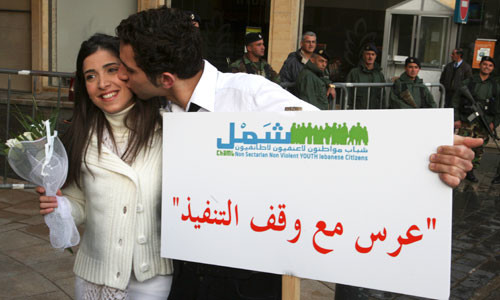Lebanon Country Page
In Lebanon, IFES continues the mission of the Status of Women in the Middle East and North Africa (SWMENA) project by focusing on gender gaps and working with local partners. The SWMENA surveys found that issues most important to Lebanese women include the amendment to the controversial Nationality Law, and the proposal of a Citizenship Law.
What We Are Doing
- Hosting a regional lessons learned in Morocco in December 2011 with SWMENA advisors and partners to discuss the IFES and SWMENA impact and solicit suggestions for improvement of future activities.
- Finalizing the Lebanon country report for publication
Our Impact
- In October 2011, IFES hosted a local lessons learned workshop in Beirut, Lebanon to discuss the IFES and SWMENA impact and solicit suggestions for improvement on future activities.
- IFES conducted an "Infographics for Advocacy" two-day workshop on July 20-21, 2011 for 20 members of women’s NGOs from Lebanon, Morocco, and Yemen. To learn more, click here.
- Between January and June 2011, IFES’ subawardee, CFUWI implemented the “Networking, Advocacy and Lobbying to Amend the Nationality Law in Lebanon” project. The project advocates for changes to the Nationality Law through a public awareness campaign, meetings with members of parliament, and a media campaign. The initiative used SWMENA opinion data which shows that 82% of women and 73% of men expressed a desire to change the nationality law. Lebanese nationality can only be passed on by father, regardless of the nationality of the mother according to the law. By contrast, Lebanese women who are married to foreign men are prohibited from passing their nationality on to their family members. To learn more about CFUWI, click here.
- In December 2011, as a direct request from NGOs who had identified a need for additional training, the SWMENA team conducted an interactive M&E training in Beirut, focusing on variety of tools and methods to conduct monitoring and evaluation for NGO activities.
- In September 2010, IFES conducted a proposal writing and financial management training for NGOS.
- IFES conducted a capacity building workshop on advocacy skills and techniques during June 2010 for members of NGOs and university students. During the workshop, IFES’ advocacy specialist led an interactive workshop focused on topics such as advocacy techniques and delivery of testimony to parliament. This was based largely on IFES’ Lobby Training Manual, available on the SWMENA website in English and Arabic.
- In June 2010, IFES conducted a roundtable with executive members of NGOs to gather recommendations on how to improve women’s advocacy efforts in the country and to provide the NGOs with the parliamentarians’ feedback on what information they need from women’s advocates.
- In June 2010, IFES met with Lebanese parliamentarians to provide them with the SWMENA results and to hear their recommendations about how women’s advocates can improve communication with members of parliament so that they can advocate on women’s issues in the government.
- In February 2010, IFES gathered NGO representatives and university students in Beirut for the project’s first data dissemination workshop, releasing the initial Lebanon survey findings and eliciting feedback and analysis on the results from local stakeholders. IFES presented participants with an overview of the survey and respondent demographics and covered the results of six of the major topics included in the questionnaire. The results are summarized in topic briefs, available in English and Arabic.
- During August 2009, IFES’ Research Specialist worked in partnership with a local survey firm, Statistics Lebanon, to implement the SWMENA Lebanon survey through in person interviews of 2,750 Lebanese men and women aged 18 years and older.
- In May 2009 IFES SWMENA also conducted an NGO workshop in Beirut to collect information from local NGOs and academics on important data gaps needed by women’s advocates for their work in Lebanon. From this information, the questions for the country specific surveys were derived.
- In May 2009, IFES, IWPR and advisors from Lebanon, Morocco and Yemen convened in Beirut for a regional Indicator Working Group Meeting. During this meeting, IFES and IWPR worked with the local advisors to create the basis for the comparative portion of the SWMENA surveys.
Topic Briefs
Lebanon
- Project Overview & Respondent Demographics
- Civic and Political Participation Topic Brief
- Economic and Educational Status of Women
- Control of Financial Assets Topic Brief
- Social Attitudes Toward Women Topic Brief
- Attitudes Towards Policy Change Topic Brief
- Freedom of Movement, & Freedom from Harassment & Violence Topic Brief
- Health Care Access Topic Brief
Topics



